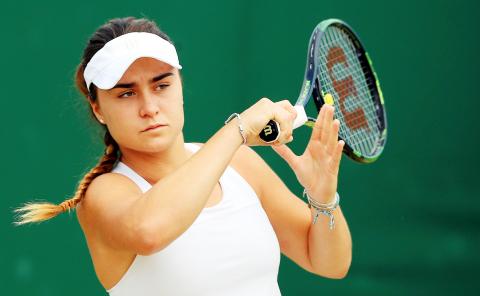Detectives were investigating allegations that a British player at the Wimbledon tennis tournament was poisoned, after she fell ill with a bacterial infection that can be spread through rat urine, London’s Metropolitan Police said on Thursday.
Gabriella Taylor was playing in Wimbledon’s junior tournament when she became sick on July 6 and had to drop out.
Her family says she was diagnosed with leptospirosis, a bacterial infection spread by animals.

Photo: AP
Her mother, Milena Taylor, told the Daily Telegraph newspaper that the 18-year-old athlete was hospitalized in intensive care and that “the bacteria the infection team found is so rare in Britain that we feel this could not have been an accident.”
She said Gabrielle “was staying in a completely healthy environment” during the tournament and would not likely have been accidentally exposed to the bacteria.
London’s Metropolitan Police said detectives were investigating “an allegation of poisoning with intent to endanger life” or cause bodily harm.
It said the incident was “alleged to have taken place at an address in Wimbledon” between July 1 and July 10.
The force said no one had been arrested and police are awaiting medical information about what, if any, poison was involved.
Britain’s National Health Service says leptospirosis is uncommon in the UK, with fewer than 40 cases reported per year. It can be caught by touching soil or water contaminated with the urine of infected animals, including cattle, pigs, dogs and particularly rats.
It usually causes mild flu-like symptoms, but in some cases can lead to organ failure and internal bleeding.
Scientists cast doubt on suggestions that Taylor was deliberately infected with the bug.
Kimon Andreas Karatzas, assistant professor of food microbiology at the University of Reading, said it might be difficult to track down the source of the infection because leptospirosis has a long incubation period. It takes between five and 14 days, and in rare cases up to a month, before symptoms appear.
And he said the rare bacterium was not an obvious candidate as a poison.
“There are other bacteria that are much easier to find,” such as salmonella, often found in raw chicken,” Karatzas said.
“Trying to find leptospirosis, it’s a much more difficult task,” Karatzas said.
David Mabey, professor of communicable diseases at the London School of Hygiene and Tropical Medicine, said that leptospirosis “is not a bug you can grow in the lab” and is most often caught by swimming in contaminated water.
“If you were wanting to poison someone, this would be an extremely roundabout way of going about it,” Mabey said. “You’d have to catch a rat, make sure it was infected and get it to pee in her bathwater or something.”
Taylor on Wednesday tweeted a picture of herself on a tennis court with the caption: “So happy to be back on court!! Taking it step by step!”

Freddie Freeman homered and drove in four runs, Shohei Ohtani also went deep and Roki Sasaki earned his first major league win as the Los Angeles Dodgers beat the Atlanta Braves 10-3 on Saturday night for their seventh straight victory. The Dodgers have won the first two games of the series to improve to 5-0 against Atlanta this year. Los Angeles’ three-game sweep at home early in the season left the Braves 0-7. Sasaki allowed three runs and six hits over five innings. The 23-year-old right-hander gave up a home run to Ozzie Albies, but received plenty of offensive support in his

INTER AWAIT: Superb saves by PSG ’keeper Gianluigi Donnarumma inspired the victory, as Arsenal were punished for misses, including one by Bukayo Saka Arsenal on Wednesday fell short on the big stage again as their painful UEFA Champions League semi-final exit against Paris Saint-Germain left Mikel Arteta to rue his club’s failure to provide him with enough attacking options. Arteta’s side were unable to reach the Champions League final for the first time in 19 years as PSG clinched a tense 2-1 win at Parc des Princes. Trailing 1-0 from last week’s first leg in London, the Gunners made a blistering start to the second leg, but could not convert their chances as Gianluigi Donnarumma’s superb saves inspired PSG’s 3-1 aggregate victory. Arsenal were punished for

Bayern Munich on Sunday were crowned German champions for the 34th time, giving striker Harry Kane his first major trophy, after second-placed Bayer 04 Leverkusen drew 2-2 at SC Freiburg. Bayern’s 3-3 draw at RB Leipzig on Saturday, when the Bavarians came from two goals down to take the lead before conceding a stoppage-time equalizer, meant defending Bundesliga champions Leverkusen needed to win at Freiburg to delay the title party. Leverkusen were two goals down before scoring twice in the final 10 minutes, but Xabi Alonso’s side could not find a third, as Bayern reclaimed the title at the first attempt after

THRILLER: Raphinha gave Barca a 3-2 lead with two minutes remaining of regular time, but Francesco Acerbi equalized the game in the second minute of added time Davide Frattesi on Tuesday fired Inter into the UEFA Champions League final with an extra-time winner that gave the Italians a stunning 4-3 triumph over Barcelona, 7-6 on aggregate. Italy midfielder Frattesi won a tie for the ages under a downpour in Milan when he lashed home in the 99th minute, sending a packed and rocking San Siro wild with joy. Simone Inzaghi’s team will face either Arsenal or Paris Saint-Germain at the end of this month in Munich, Germany, where they would feel they have a great chance to be crowned kings of Europe for a fourth time after